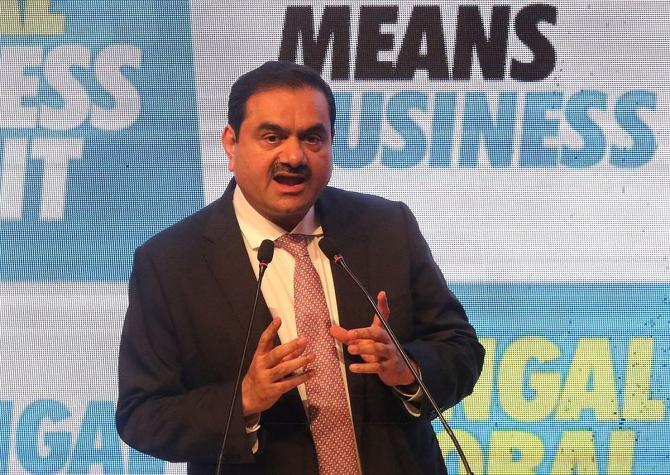The Adani stock price saga will pass into public memory as one of those matters that simply escaped being nailed down, perhaps because too many vested interests were involved, notes Debashis Basu.

US Judge Potter Stewart will be remembered for his famous definition of obscenity and pornography at a time when the US justice system was struggling to balance freedom of expression and the state's job to maintain public decency.
He quipped: 'I shall not today attempt further to define the kinds of material I understand to be embraced within that shorthand description, and perhaps I could never succeed in intelligibly doing so. But I know it when I see it...'
This rule applies to various aspects of our lives where rigid definitions are hard to establish or decisions have to be made under uncertainty.
One has to go by rule of thumb or heuristics, or the 'smell test', which it is often called in the financial world when things look abnormal but one can't pin anything down.
People walk away from deals when things don't smell right.
They don't wait for a regulator to conclude an investigation and nail the accused over 20 years. Why is this relevant?
In late January 2023, Hindenburg Research, a US financial firm, published a report alleging that Adani Group stocks were overpriced, the group had broken several securities laws, and the fair value of the group's stocks should be significantly lower.
This report led to an immediate crash in Adani stocks, attracting some public interest petitions.
Instead of rejecting the petitions (because the Supreme Court would have had many more pressing matters to hear), the court set up an expert committee to examine three key issues in two months.
The committee delivered its 178-page report on May 6.
On the main issue of any regulatory failure, the committee has concluded there has been no failure so far on the part of the Securities and Exchange Board of India (Sebi) with regard to Hindenburg's three main allegations: a. violation of minimum public shareholding; b. non-disclosure of related-party transactions; and c. price manipulation in Adani stocks.
Sebi is yet to present its report, but no one is waiting for it anymore.
Let's look at this from a public-perception perspective.
Here are some facts about Adani stocks that remain smelly despite an apparent clean chit from the committee.
Smell Test #1
Adani shares were insanely rigged: Adani Green soared more than 5,000 per cent in three years, going up from Rs 55 to Rs 3,000; Adani Transmission was pushed up 1,500 per cent in two years, increasing from Rs 250 to Rs 4,000; Adani Total Gas zoomed 3,800 per cent in 2.5 years, up from Rs 100 to Rs 3,900; and Adani Enterprises went up almost 2,200 per cent in 2.5 years, from Rs 175 to Rs 4,000.
On January 20, 2023, when Adani Total Gas had a jaw-dropping price/earnings multiple of 850, its peer group, comprising Indraprastha Gas, Mahanagar Gas, and Gujarat Gas, traded at multiples of 19.7, 15.9, and 23.3, respectively.
It is still at 141, while the peer group is around the same at 23, 13, and 22, respectively.
As Judge Stewart would have said, we know it when we see it.
I will repeat myself here from a previous column because it bears repetition of how brazen the alleged manipulation was.
At its peak, Adani Enterprises, a component of the Nifty 50, was valued at a price-to-earnings (P/E) ratio of 427.
If Reliance Industries was valued at a P/E of, say, 400, its market capitalisation today would be 16 times what it is and Mukesh Ambani would be the world's first trillionaire, with a net worth of $1.38trn (trillion)!
And, of course, if TCS and Infosys were similarly valued, the BSE Sensex would be 8-10 times higher at 480,000 to 600,000 instead of 60,000 or so!
On the other hand, if Adani shares were valued as modestly (or correctly) as those of Tata Consultancy Services or Reliance Industries, Gautam Adani's peak net worth would have been only a few billion dollars, not $150 billion, which briefly made him the world's third-richest man.
The Hindenburg report pricked this huge bubble, even if temporarily.
Smell Test #2
The investor issue: Why is Adani Group not able to boast of many marquee global investors including sovereign funds and large pension funds?
Why are the majority of portfolio investors outfits that invest primarily in Adani stocks and a sprinkling of others?
Why did four funds -- Elara India Opportunities Fund, Cresta Fund, Albula Investment Fund, and APMS Investment Fund -- invest as much as 90 per cent of their $6.9 billion under management in the Adani empire?
Smell Test #3
Sebi's surveillance: Sebi has been claiming it has 'deeply integrated technology' in its surveillance functions, which helps it unearth the complex modus operandi of manipulation.
It claimed the use of 'various innovative techniques, such as pattern recognition and data analytics' to process over 5.50 billion trade messages that are generated every day.
In the 2021-2022 annual report of Sebi, a box titled Data Detectives boasted the use of artificial intelligence and machine learning for 'robust, agile and scalable capabilities'.
Another claim was a 'Data Lake', which reportedly 'has characteristics such as visualization, time series/machine learning analytical capabilities, ability to seek and search both structured/unstructured/semi-structured data, self-service business intelligence capabilities, in-memory processing of data, etc'.
And yet, while Sebi has completed scores of investigations into price and volume manipulation over the last few years, it did not notice anything wrong with the 5,000 per cent stock price rise in Adani Green.
While the Adani Group sympathisers can go blue in their face proclaiming innocence, the Adani stock price saga will pass into public memory as one of those matters that simply escaped being nailed down, perhaps because too many vested interests were involved.
Remember, no one killed the six innocent people though a film star's vehicle ran over them in Mumbai.
No one killed Arushi and Hemraj.
And no one manipulated Adani stocks.
Debashis Basu is editor of moneylife.in and a trustee of the Moneylife Foundation












 © 2025
© 2025